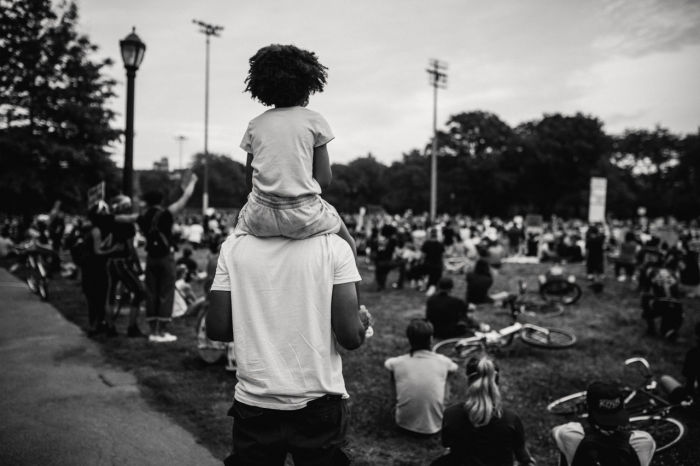Our silence on racism begins with a paradox we feel compelled to ignore. Because examining it would threaten our true belief: we are exceptional.

At the root of American identity is an impossible paradox. A truth we wish could coexist so much, we would take up arms to defend it.
We want to be exceptional and equal at the same time. But we can’t. It’s impossible.
And when people point out this impossibility, we get nervous and break things. We even concoct reasons to justify killings as necessary or deserved.
But we can’t shake it or make it go away.
To be exceptional means we aren’t equal. And it necessitates division by making one group superior and all others inferior.
Through slavery and Jim Crow, white people overtly declared their superiority and used their political will to enshrine it in law and science. And many used religion to do it. But even in maintaining “white” culture as the norm, we can’t also declare it as neutral.
Superior or Equal. It can’t be both.
What is most strange about the defense of whiteness is how hard it tries to be seen as equal. Almost as if its defenders know that arguing for the supposed genetic and cultural superiority of European Americans is both racist and ridiculous. As if they could admit it is intellectually bankrupt and morally repugnant. Almost.
The first evil is the exceptionalism. The second is pretending that isn’t there.
Exceptional Isn’t
The compulsion to defend exceptionalism is equal to the desire not to upset its defenders.
But the implicit paradox of whiteness as both exceptional and equal manifests further impossibilities.
Take for example the paradox of Stand Your Ground laws which inherently removes one party’s ability to do so. The expectation to retreat preserves equality. But when we expand self-defense in this way, we produce a right to self-offense. Predictably in one way and with racist ramifications.
But…
If we believe in a God of love… A God whose nature is freedom and frees people from oppression… The same God who freed the Hebrews and told them to remember what that’s like so that you never do that to anyone! The God who endured suffering and evil to share in our reconciliation through Jesus…
If we believe in a God of love we don’t need to believe in exceptionalism. We don’t need superiority or protection for our cultural norms. We don’t need to be better than anyone.
Believing in a God of love means vulnerability and hope. And it means we recognize how we are all truly equal deep down, but can’t be equal under the law when some get to be superior by the lottery of their birth.
Such a belief means we don’t need to defend our false divisions and oppressive beliefs. We don’t get to think the color of our skin and cultural domination are tied to our worth as human beings. Nor is anyone else’s worth tied to such dangerous and meaningless belief.
We are a people of love and new life. And we are called to bring life out of death, courage out of hopelessness, equality out of systems of oppression.
None of us is called to stand their ground if we can’t stand on our public ground together as equals.
This is my last (intentional) reflection on Kelly Brown Douglas’s book, Stand Your Ground: Black Bodies and the Justice of God. I previously wrote reflections on Part One and Part Two and several chapter summaries and reflections.
I highly recommend reading the book yourself. She doesn’t start where we usually do: in our own neighborhoods and experiences. But instead, she draws us back to the beginning of our country, when European men believed in their own superiority. And then built a country around it.
It is a thorough, convincing, and heartbreaking book.
